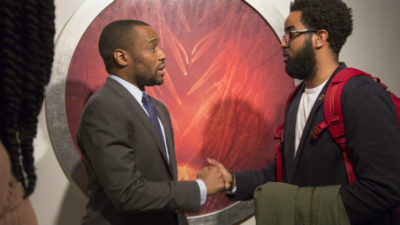Hill Provides Tools to “Animate the Struggle”
In what is considered, by some, a post-racial society, those attending the Martin Luther King, Jr. Lecture were asked to help change the path of America and consider what King asked in the title of his book: “Where do we go from here: chaos or community?”
Marc Lamont Hill, Ph.D., spoke to an overflow crowd at the University of Missouri-Kansas City to honor the memory of King and encourage students and community to take action.
“When you get invited to talk about the legacy of Martin Luther King, it’s quite an honor. His holiday emerged out of struggle and was celebrated for the first time 20 years after his death,” said Hill, an award-winning journalist, anthropologist and author. “In the age of Obama, we have a Black man in D.C. in public housing. It’s a marker of what’s possible.”
Hill’s topic, “Building Community in an Hour of Chaos: Progress in the Age of Obama,” provided details about King to set the stage for what’s needed today to make America an inclusive nation.
He said King was not threatening America in his speeches and letters, but rather he was prophesying about what could come to America if changes did not occur.
“King was more international in his focus, and I want students to think of the greater good – the community and inclusion, not the individual,” said Hill. “I want to talk to the students about moving into the future and to provide tools to them and the community for organizing.”
Hill returned often to the chaos that seems so prevalent today. He said America is the richest empire in human history while children go to bed hungry each night and, more strikingly, war is now the primary instrument used to gain peace throughout our world.
He pointed out some stark realizations:
- We are only a century past emancipation
- Several decades ago, Blacks were not allowed to take photos in front of the Washington Monument, but dogs were allowed to have their pictures taken
- The idea that African Americans are human is relatively new
- Slaves were freed and joined the army
- An acknowledgment of America’s poor doesn’t occur in speeches by our leaders
- 62 people have as much wealth as 3.5 billion people
“Slaves believed in America more than America did,” said Hill. “Listen to yourself, America. You have no idea of who you have in your midst. Keep your promises.
“Is the world bad?” asked Hill. “The world is messed up and that is why we are needed. How do we make the world better? Our dreams have been scaled down to the level of immediate experiences. We must now release our imaginations to what’s possible.”
Hill pointed out numerous ways to improve the world, including listening, reading and organizing.
“Listening is difficult in the moment because there is so much talking going on. Blogs, Facebook and Twitter are all outlets for talking. Because we’re all talking, we believe we are conversing,” said Hill. “Listening is an investment in the ideas of someone else.”
He told the audience that listening is an ethical and moral thing to do, but equally important, listening is a way to build a coalition. He stressed the value King found in listening – to his children, young people throughout the world, the sanitation workers, civil rights leaders and anti-war activists.
“Young people have made the nation work, and they animate the struggle – we have to give them a chance. We operate from the assumption that young people don’t know what to do or aren’t ready to lead. We want them to be perfect before we turn over the reins. Remember, King was only 39 years old when he was assassinated,” said Hill.
According to Hill, coalitions are strongest when we are connected, and in spite of our differing agendas and struggles, we must remain connected.
It is widely known Martin Luther King read extensively, including books by Phillis Wheatley, W.E.B. DuBois, Marx and Socrates. Many of his choices were by authors with differing beliefs.
“Students, read these books,” said Hill authoritatively. “You need to know differing views to generate new ideas. We need to ask different questions to get different answers. And you must act bravely,” said Hill. “It’s no longer about everything public being bad, predatory lending or driving while black, which is now about patrolling while racist.”
Hill said when you act, make a commitment to do something, anything. He presented three of the many reasons to act – they stole our elections; people have no food; and children are struggling to read.
“We’re building first-class jails and second-class schools,” said Hill.
“Organize – join an organization; it’s part of our legacy. Use a model where you don’t need to have a front row seat. Don’t make it about an individual because it’s about ‘us, the community,’” said Hill.
In the midst of providing the tools, Hill told the audience that they must speak the truth even though it may be bitter, stressing the solitude they will experience when standing on principles and telling the truth.
“If you’re feeling alone, know you’re doing something right. Stand up, dust yourself off and do the work. Organize, have a purpose and know your end game,” said Hill.
He ended his passion-filled lecture by saying that all people deserve three things: good love, healthy choices and second chances.
|Wandra Brooks Green, Division of Strategic Marketing and Communications

